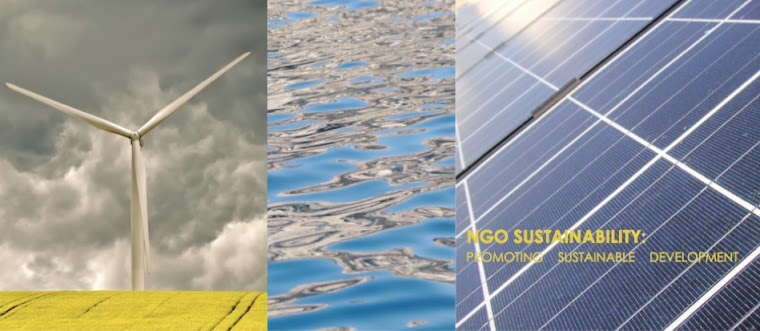Roma Stibravy (President) attended a panel discussion in honor of World Water Day, "Water for Energy, Energy for Water" co-organized by the Permanent Missions of the "Green Group" countries, Cape Verde, Costa Rica, Iceland, Singapore, Slovenia and the United Arab Emirates at the United Nations Headquarters, NY.
UN NGO Sustainability, Inc.
The integration of the three components of sustainable development: economic development, social development and environmental protection/renewable energy. We also seek to build an understanding of how the different parts of the United Nations promote sustainable development. We pay particular attention to renewable energy projects and women's empowerment.
Sunday, March 27, 2011
Thursday, March 3, 2011
The Climate Challenge; India Prospective: 2011; Jefferies Conference
Roma Stibravy, President attended "The Climate Challenge; Revitalizing the Debate" at Columbia University's Earth Institute on October 11, 2010 in New York City,NY.
Key-notes present included Katherine Richardson, Chair of the Danish Commission on Climate Change, and Jeffrey D. Sachs, an American economist, writer and the Director of the Earth Institute. The discussion panel addressed necessary policy changes that would encourage the private and public sector to increase their efforts to combat negative climate change.
Additionally, Ms. Stibravy, the Board Members and interns were guests at Jefferies' annual Clean Technology Conference on February 23, 24, 2011 in New York City,NY. The conference featured over 100 public and private companies from the clean energy and technology sector. Presenters discussed global green-trend initiatives and identified both short and long-term investment opportunities.
For more information about Jefferies, Inc. and its Clean Technology Conference, please click here.
On March 1, 2011 Mrs. Stibravy attended the third annual India Prospective: 2011 in New York City,NY hosted by The Asia Society. KPMG and U.S. India Business Council co-sponsored the event.
Key-notes present included Katherine Richardson, Chair of the Danish Commission on Climate Change, and Jeffrey D. Sachs, an American economist, writer and the Director of the Earth Institute. The discussion panel addressed necessary policy changes that would encourage the private and public sector to increase their efforts to combat negative climate change.
Additionally, Ms. Stibravy, the Board Members and interns were guests at Jefferies' annual Clean Technology Conference on February 23, 24, 2011 in New York City,NY. The conference featured over 100 public and private companies from the clean energy and technology sector. Presenters discussed global green-trend initiatives and identified both short and long-term investment opportunities.
For more information about Jefferies, Inc. and its Clean Technology Conference, please click here.
On March 1, 2011 Mrs. Stibravy attended the third annual India Prospective: 2011 in New York City,NY hosted by The Asia Society. KPMG and U.S. India Business Council co-sponsored the event.
At the end of February, Indian government will publish it's Economic Survey and submit its Budget to the Indian Parliament. The experts below discussed the survey and budget, providing an overview of the publications and their personal opinions on India's economic prospects.
The following people spoke during the event:
- Dr. Ajay Gondane, Deputy Consul General of India, New York
- Arun Kumar, Partner in charge, U.S. India Practice, KPMG LLP, and USIBC Board Member (moderator)
- Arvind Panagariya, Jagdish Bhagwati Professor of Indian Political Economy, Columbia University
- Wilbur Ross Jr., Chairman & CEO, WL Ross & Co; Chairman, Invesco Private Limited
- Amb. Frank G. Wisner, Former U.S. Ambassador to India; Foreign Affairs Advisor; Patton Boggs; and USIBC Board Member
For more information on the event, please click here.
3 Articles of Interest from the New York Times
"Regulation Lax as Gas Wells’ Tainted Water Hits Rivers"
Drilling companies recently developed technologies to reach enormous reserves of natural gas.
Environmentalists claim that natural gas burns cleaner than oil and therefore has less impact on climate change. However, the new drilling method (high-volume horizontal hydraulic fracturing or hydrofracking) also carries great environmental risks. This process produces over a million gallons of waste water that, often laced with highly corrosive salts, carcinogens, and radium.
Documents from the Environmental Protection Agency show that the dangers to the environment and health are greater than previously understood.
Source: Click Here
"How to Make Your Business Greener (And Save Money)"
Companies are discovering that "going green" not only benefits the environment, but also saves them money. Reductions in both greenhouse gas emissions and business costs can be as simple as replacing pickup trucks with hybrids, particularly for employees who do not need a truck. Also, recycling companies tend to haul away materials that can be reused for free so long as one separates his/her trash prior. Because simple procedures can produce large savings, managers are realizing that going green is less daunting.
Source: Click Here.
"Alternative Fuels Don't Benefit the Military, a RAND Report Says"
The RAND Corp. recently released a report saying: “most alternative-fuel technologies were unproven, too expensive or too far from commercial scale to meet the military’s need over the next decade”. They claimed that the most economical and ready solution meeting both environmental reductions and present military needs is a liquid fuel consisting of combination of coal and biomass. This fuel is a high-energy intensive process that extracts oil from coal. According to the opponents of the report this view is short sighted for it does not put any emphasis on research. While liquid fuel reduces the military’s need for foreign oil, it switches that demand over to coal, which may not be considered a clean enough energy source.
Source: Click Here.
Subscribe to:
Posts (Atom)
